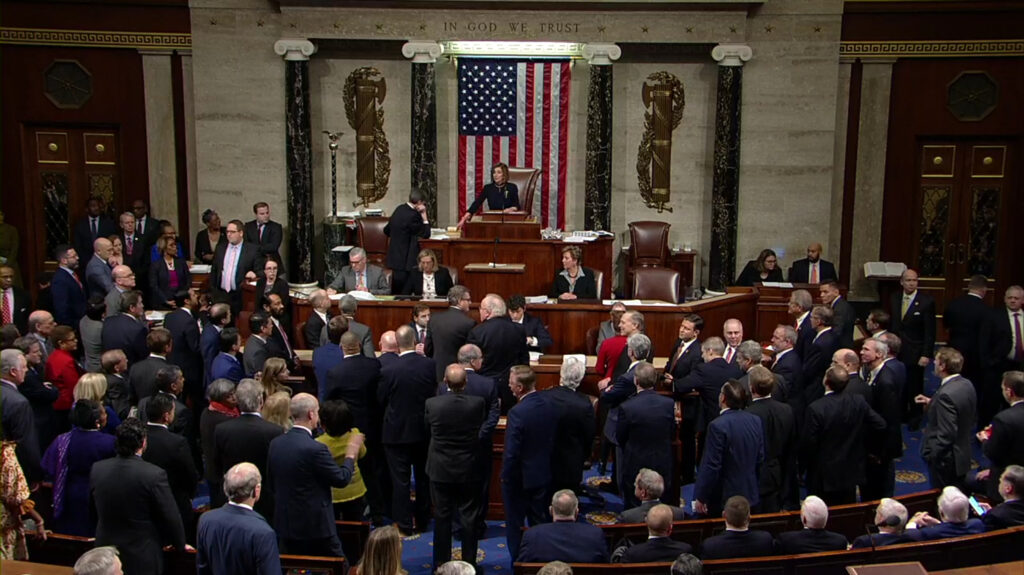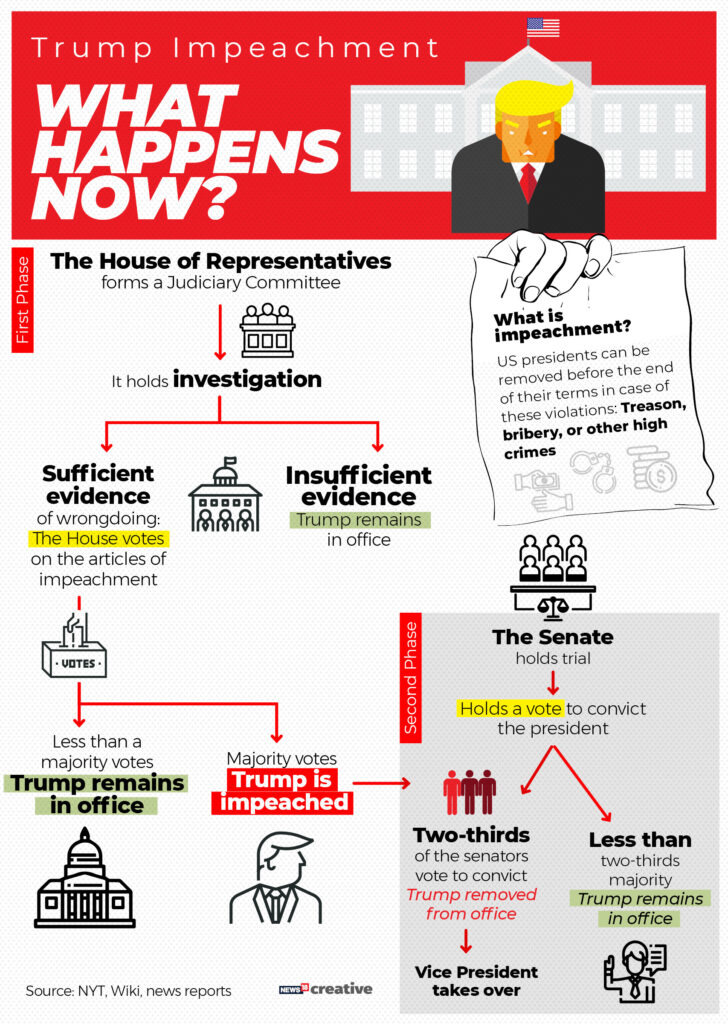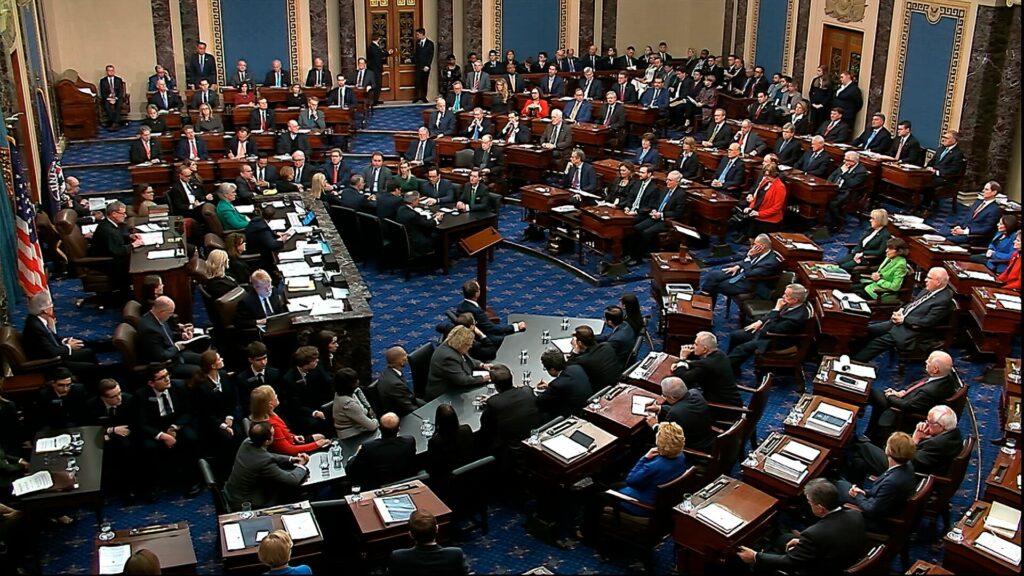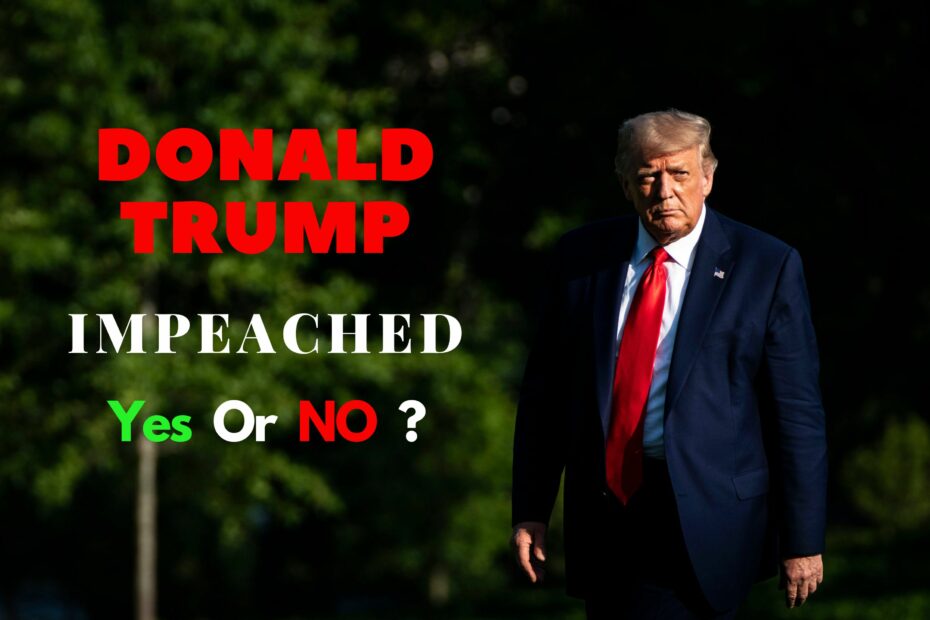Last updated on May 17th, 2023 at 01:09 am
Do you have a question in mind about whether Donald Trump is ever impeached or not? the answer is Yes, Donald Trump has been impeached twice by the US House of Representatives. The first impeachment occurred on December 18, 2019, and the second impeachment occurred on January 13, 2021. However, he was acquitted by the Senate in both impeachment trials.
Donald Trump’s First Impeachment

Introduction
On December 18, 2019, the House of Representatives voted to impeach the 45th President, Donald Trump, for abuse of power and obstruction of Congress. In voting along party lines: 230 were in favor, 197 were against, and 1 was present. After concerns about his alleged attempts to seek foreign interference in the 2020 election.
In September 2019, the public learned of a whistleblower complaint regarding a July phone call between Trump and Ukrainian President Volodymyr Zelensky. The complaint, which was corroborated by the acting Ambassador to Ukraine, stated that Trump had threatened to withhold U.S. foreign aid money until Zelensky promised to investigate Hunter Biden, son of leading Democratic 2020 candidate Joe Biden, for suspicious dealings in Ukraine.
The White House denied any “quid pro quo.” Nonetheless, by late November, it was clear that the Democrats felt confident enough in their case for wrongdoing and obstruction of Congress that they would go through with impeachment.
After both articles were approved in the House, the case then moved to a Senate trial, which began on January 16, 2020. U.S. Supreme Court chief justice John Roberts presided over the trial. On February 5, 2020, in a vote that again fell largely along party lines, the Senate voted to acquit President Trump on both charges.
Background and Context of the Impeachment
The impeachment was prompted by a phone call that Trump had with Ukrainian President Volodymyr Zelensky in July 2019. During the call, Trump urged Zelensky to investigate former Vice President Joe Biden and his son, Hunter Biden, who had business interests in Ukraine.
The controversy was further fueled by the fact that Trump had withheld military aid to Ukraine, which had been approved by Congress, and which many believed was being used as leverage to pressure Zelensky into investigating the Bidens. This raised concerns about whether Trump had abused his power as President for personal political gain.
The House of Representatives, controlled by Democrats, launched an impeachment inquiry in September 2019, and ultimately approved two articles of impeachment against Trump, one for abuse of power and one for obstruction of Congress. The impeachment then moved to the Senate, where a trial was held in January-February 2020.
The Senate ultimately acquitted Trump on both charges, largely along party lines, with only one Republican senator voting to convict him on one of the charges. However, the impeachment process was a significant moment in Trump’s presidency, and it highlighted the deep political divisions in the United States.
The Impeachment Process and Charges Against Donald Trump
On December 10, 2019, the House Judiciary Committee announced that it would move forward with two articles of impeachment against President Donald Trump for his dealings with Ukraine. The first article accused Trump of abusing his power by pressuring Ukraine to investigate his political rival, Joe Biden while withholding military aid and a White House meeting. The second article accused him of obstructing Congress by directing executive branch officials to defy subpoenas and refuse to cooperate with the House impeachment inquiry. The full House of Representatives voted to impeach Trump on both articles on December 18, 2019, making him the third president in U.S. history to be impeached. However, he was acquitted by the Senate on February 5, 2020, on both charges.
Key Players and Witnesses Involved in the Impeachment

The first impeachment of Donald Trump began in late 2019 and concluded with his acquittal by the Senate in February 2020. Some of the key players and witnesses involved in the impeachment proceedings are:
- Donald Trump – The 45th President of the United States and the subject of impeachment proceedings. The articles of impeachment accused Trump of abuse of power and obstruction of Congress.
- Nancy Pelosi – The Speaker of the House of Representatives, who led the effort to impeach Trump.
- Adam Schiff – The Chairman of the House Intelligence Committee, who played a key role in the impeachment proceedings and led the investigation into Trump’s actions.
- Gordon Sondland – The U.S. Ambassador to the European Union, who testified before Congress and implicated Trump in a quid pro quo scheme involving Ukraine.
- Marie Yovanovitch – The former U.S. Ambassador to Ukraine, who was recalled from her position by Trump after she refused to cooperate with his efforts to pressure Ukraine to investigate his political rival, Joe Biden.
- Alexander Vindman – A U.S. Army lieutenant colonel and National Security Council staffer who testified before Congress about his concerns regarding Trump’s actions toward Ukraine.
- Fiona Hill – A former National Security Council official who testified before Congress and raised concerns about Trump’s Ukraine policy.
- William Taylor – The acting U.S. Ambassador to Ukraine, testified before Congress and provided key evidence regarding Trump’s efforts to pressure Ukraine.
- Lev Parnas and Igor Fruman – Two associates of Trump’s lawyer, Rudy Giuliani, who were indicted on charges of campaign finance violations and played a role in Giuliani’s efforts to pressure Ukraine.
These are just some of the key players and witnesses involved in the first impeachment of Donald Trump. Many others played important roles in the proceedings, including members of Congress, lawyers, and government officials.
Public Opinion and Political Response to the Donald Trump Impeachment
Donald Trump’s first impeachment in 2019-2020 generated a significant amount of public opinion and media coverage.
There were both supporters and critics of the impeachment, and public opinion was divided along political lines. Republicans generally opposed the impeachment, while Democrats were more supportive.
According to various polls conducted at the time, the majority of Americans supported the impeachment inquiry and believed that Trump had done something wrong. However, there was less consensus on whether he should be removed from office as a result of his actions.
Overall, the public opinion of Donald Trump’s first impeachment was mixed, with passionate arguments on both sides. The impeachment was a significant moment in American politics and will continue to be the subject of debate and analysis in the years to come.
Trump’s Defense and Response to the Impeachment
Former President Donald Trump’s lawyers plan to focus on procedural objections during his upcoming Senate impeachment trial, including challenging the constitutionality of trying him after leaving office. Trump’s lawyers argue that the trial is unconstitutional and they aim to win the case based on procedural objections. The Republican Party, which holds a majority in the Senate, is expected to deny Democrats the 67 votes they need to convict Trump. Most constitutional law experts believe that it is lawful to hold an impeachment trial after a president leaves office and that presidents who commit misconduct late in their terms should be held accountable. Trump is the third US president to be impeached, the first to be impeached twice, and the first to face trial after leaving office.
Senate Trial and Acquittal

In 2019, President Donald Trump was impeached by the US House of Representatives on charges of abuse of power and obstruction of Congress. In 2020, the Senate held an impeachment trial, during which Trump was acquitted on both counts. The Senate, which has the sole power to try all impeachments under the US Constitution, passed Majority Leader Mitch McConnell’s proposed trial rules and rejected 11 amendments proposed by Democrats. The votes were sharply divided along party lines, with Mitt Romney being the first senator in history from an impeached president’s party to vote to convict. The possible penalties were removal from office and disqualification from holding office in the future. Trump’s defense argued a lack of direct evidence of wrongdoing and that Democrats were using impeachment to steal the 2020 election. The prosecution’s opening arguments and presentation of evidence took place from January 22 to 24, 2020, and Trump’s defense presentation began on January 25. On January 31, the Senate voted against allowing subpoenas to call witnesses, including John Bolton.
Aftermath and Implications of the Impeachment
The 134-day impeachment proceedings against US President Donald Trump ended with a near party-line vote in the Senate in favor of acquittal. The events of the past week led to serious concerns about the durability of a constitutional order based on divided sovereignty. However, it was worth it for the Democrats to pursue impeachment, as Trump’s behavior threatened the constitutional order. The Ukraine affair wasn’t the first time Trump had behaved in such a way, but it was the first time standing up to him seemed politically viable. Trump’s vision of executive power sublimates the presidency’s core management functions and public service dimensions to the personal interests of the officeholder. Trump leveraged institutional weaknesses within the network of executive branch bureaucracies and the relative weakness of Congress vis-à-vis the presidency until the House took responsibility for investigating the President.
Donald Trump’s First Impeachment Important Dates:
- July 25, 2019: President Donald Trump has a phone call with Ukrainian President Volodymyr Zelensky, during which he allegedly asked for Ukraine to investigate Joe Biden’s son, Hunter Biden, and his business dealings in Ukraine.
- August 12, 2019: A whistleblower files a complaint about the phone call with the Inspector General of the Intelligence Community.
- September 9, 2019: House Intelligence Committee Chairman Adam Schiff sends a letter to Acting Director of National Intelligence Joseph Maguire requesting the whistleblower complaint.
- September 24, 2019: House Speaker Nancy Pelosi announces a formal impeachment inquiry against President Trump.
- October 8, 2019: The White House sends a letter to Speaker Pelosi and three committee chairs stating that it will not cooperate with the impeachment inquiry.
- November 13, 2019: The House Intelligence Committee begins public hearings with witnesses testifying about the phone call and related events.
- December 10, 2019: The House Judiciary Committee releases two articles of impeachment against President Trump: one for abuse of power, and one for obstruction of Congress.
- December 13, 2019: The Judiciary Committee approves the articles of impeachment.
- December 18, 2019: The House of Representatives votes to impeach President Trump, with 230 votes in favor of the abuse of power article and 229 votes in favor of the obstruction of Congress article. All Republicans voted against impeachment, along with two Democrats who vote against the abuse of power article and three who voted against the obstruction of Congress article.
- January 16, 2020: The Senate trial begins, with Chief Justice John Roberts presiding.
- January 21, 2020: The Senate votes against calling witnesses or introducing new evidence.
- February 5, 2020: The Senate votes to acquit President Trump on both articles of impeachment. The abuse of power article receives 48 votes in favor and 52 votes against, while the obstruction of Congress article receives 47 votes in favor and 53 votes against. All Democrats vote in favor of impeachment, along with Republican Senator Mitt Romney who votes in favor of the abuse of power article.
In summary, Donald Trump’s first impeachment took place from September 2019 to February 2020, with the House voting to impeach him on December 18, 2019, and the Senate voting to acquit him on February 5, 2020, after a trial that lasted several weeks. The officers involved in the process included Speaker Pelosi, Chairman Schiff, Chief Justice Roberts, and Acting Director Maguire. The impeachment proceedings included public hearings, the introduction of articles of impeachment, a House vote to impeach, a Senate trial, and a Senate vote to acquit.
Conclusion and Future Implications for American Politics
The first impeachment of former US President Donald Trump, which took place in December 2019 and January 2020, has several future implications. Some of these implications include:
Impact on future presidential behavior:
The impeachment process and the eventual acquittal of Trump may have set a precedent for future presidents to engage in similar behavior. The impeachment proceedings may have made it clear that certain actions by a president, even if they violate ethical and moral standards, may not result in removal from office.
Increased political polarization:
The impeachment process and the subsequent acquittal further polarized the political climate in the United States. This polarization may have long-term implications on the ability of the government to work together to address important issues.
Legal implications:
The impeachment process revealed potential legal issues surrounding presidential powers and actions. These legal implications may have significant impacts on future presidential actions and the interpretation of the law.
Impact on international relations:
The impeachment proceedings received significant attention from the international community. The outcome of the process may impact the relationship between the United States and other countries.
Impact on the Republican Party:
The impeachment process highlighted divisions within the Republican Party. The acquittal of Trump may have emboldened some factions of the party while alienating others. This may have implications for the future direction of the Republican Party.
Second Impeachment of Donald Trump
What is incitement of insurrection?
Incitement of insurrection means that someone is promoting, organizing, and encouraging people to revolt against the government.
About it:
Trump became only the third president ever to be impeached after Andrew Johnson and Bill Clinton also made history about being impeached twice.
The second impeachment trial of Donald Trump began on February 9, 2021, in the Senate. The trial centered on the charge of incitement of insurrection, related to January 6, 2021, attack on the U.S. Capitol by a mob of his supporters. Trump’s defense team argued that the trial was unconstitutional because he was no longer in office at the time of the trial, but the Senate voted to proceed with the trial. The trial concluded on February 13, 2021, with a vote of 57-43 in favor of convicting Trump, falling short of the two-thirds majority required for conviction. This was the most bipartisan impeachment vote in U.S. history, with seven Republicans joining all Democrats in voting to convict Trump.
The events leading up to the Capitol riot
The events leading up to the Capitol riot were a major focus of Donald Trump’s second impeachment trial. Here are some of the key moments:
The 2020 Presidential Election:
The November 2020 presidential election was a major source of contention, with Donald Trump and his supporters claiming without evidence that the election was rigged or stolen.
Trump’s false claims of voter fraud:
In the weeks leading up to the riot, Trump repeatedly made false claims of widespread voter fraud and irregularities in the election. He claimed that the election was “stolen” from him and his supporters.
Trump’s rally on January 6:
On the day of the riot, Trump held a rally near the White House, where he urged his supporters to march to the Capitol and “fight like hell” to overturn the election results. He also repeated false claims of voter fraud and encouraged his supporters to “never give up” and “never concede.”
The Storming of the Capitol:
After Trump’s rally, a mob of his supporters stormed the U.S. Capitol, breaking into the building and disrupting the certification of the electoral college results. The rioters clashed with police, vandalized offices, and caused widespread damage.
Trump’s response to the riot:
As the riot unfolded, Trump initially refused to condemn the violence, instead repeating false claims about the election and expressing sympathy for the rioters. He eventually released a video statement urging his supporters to go home but continued to claim that the election was stolen from him.
The charge of incitement of insurrection
On February 9, 2021, the Senate began its impeachment trial of former President Donald Trump, with the charge of “incitement of insurrection” related to the January 6, 2021, riot at the U.S. Capitol. The impeachment article argued that Trump’s false claims of election fraud and his speech on the day of the violence encouraged and resulted in the lawless action at the Capitol. The House approved articles 232-197, with 10 Republicans joining all Democrats in favor of the resolution. It will require a two-thirds majority of senators, or 67 votes, to convict Trump, which is considered unlikely. The trial is ongoing and updates are available through news sources.
The defense’s arguments against impeachment
During the impeachment trial, House Democratic impeachment managers argued that Trump laid the groundwork for the violence at the Capitol through his baseless insistence that the presidential election results were fraudulent. They presented evidence that they argued showed Trump told the mob to come to Washington, DC on January 6, gave them their marching orders, and then refrained from calling off the rioters after the violence started. Democrats played graphic videos of rioters storming the Capitol mixed with Trump’s remarks and tweets he made throughout the day. Trump’s defense team argued that his speech was not “incitement” and was protected by constitutional free-speech protections. They also claimed that the Democrats’ presentation was misleading, filled with “doctored evidence” and that the trial was “political theatre” driven by Democrats who have been against Trump since he announced his first presidential campaign six years ago.
Important dates related to Donald Trump’s second impeachment:
- January 6, 2021: A mob of Trump supporters storms the U.S. Capitol in an attempt to overturn the results of the 2020 presidential election.
- January 13, 2021: The House of Representatives votes to impeach Trump on a charge of incitement of insurrection, making him the first U.S. president to be impeached twice.
- January 20, 2021: Joe Biden is inaugurated as the 46th President of the United States, and Trump leaves office.
- February 9, 2021: The Senate impeachment trial of Donald Trump begins.
- February 13, 2021: The Senate votes to acquit Trump, with 57 Senators voting to convict and 43 voting to acquit. A two-thirds majority vote of 67 Senators is needed to convict.
Important deaths related to the events leading up to and during the Capitol riot on January 6, 2021:
- Brian Sicknick: A Capitol Police officer who died after being injured during the riot.
- Ashli Babbitt: A Trump supporter who was shot and killed by police while attempting to enter the Speaker’s Lobby inside the Capitol.
- Rosanne Boyland: A Trump supporter who died after being trampled during the riot.
- Kevin Greeson: A Trump supporter who suffered a heart attack during the riot.
- Benjamin Phillips: A Trump supporter who died of a stroke during the riot.
The Outcome and Aftermath of the impeachment trial
The aftermath of Donald Trump’s second impeachment has been marked by both political and legal fallout. On the political front, while Trump was acquitted by the Senate, the trial itself served to further divide an already deeply polarized country. Many Democrats and some Republicans argued that Trump’s actions on January 6th constituted incitement of insurrection and that he should be held accountable, while other Republicans argued that the impeachment trial was unconstitutional and a waste of time.
In the legal realm, there are ongoing investigations into the events of January 6th, including a federal criminal investigation into the Capitol riot and a separate investigation by the House of Representatives into Trump’s role in the events leading up to the attack. Additionally, Trump is facing several civil lawsuits related to his actions while in office, including defamation suits filed by women who accused him of sexual assault and a lawsuit filed by the NAACP alleging that Trump and others violated the Ku Klux Klan Act by conspiring to incite violence against lawmakers.
The impeachment trial has also had an impact on the Republican Party, with some prominent figures, such as Senate Minority Leader Mitch McConnell, acknowledging Trump’s responsibility for the events of January 6th and calling for a move away from Trumpism. However, many Republicans continue to support Trump and his brand of politics, setting the stage for continued political battles in the coming years.
